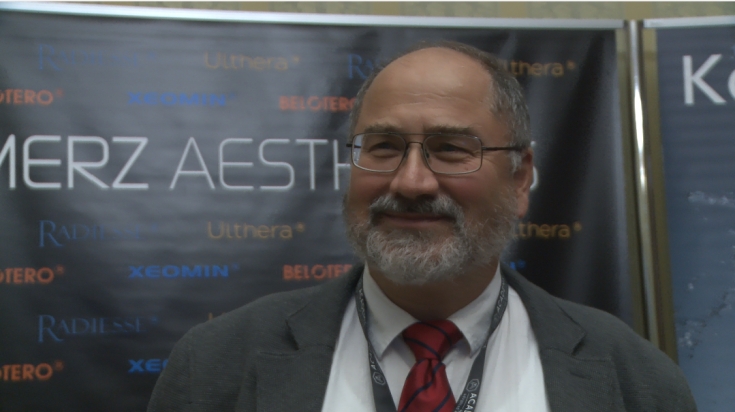Today it is difficult to imagine aesthetic medicine without botulinum toxin therapy. For many decades, botulinum toxin has been successfully used in the correction of age-related changes. However, botulinum toxin preparations are more or less immunogenic, which can stimulate the production of specific antibodies in response to their administration.
Neutralization of botulinum toxin preparations significantly reduces the effectiveness of the procedure. How to prevent the formation of specific antibodies, and how to achieve the maximum effect from the botulinum therapy procedure?
This was told exclusively for estet-portal.com by an immunologist, professor Michael Martin (Germany).
Botulinum toxin antibodies: are they a clinical problem
MM: Yes, absolutely. Botulinum toxin is a protein produced by the bacterium Clostridium botulinum. We have been successfully using it for medical purposes for many years. However, antibodies may be produced in response to the injection of a botulinum toxin preparation.

You can compare this with vaccination, for example, against tetanus: the introduction of toxoid promotes the development of specific antitoxic immunity, that is, the formation of antibodies to tetanus toxin.
Follow us on Telegram
But it is also produced by bacteria of the genus Clostridia. A similar situation may arise with botulinum toxin: in response to the administration of the drug, specific antibodies will be developed that will form immune complexes with it. This neutralizes and deactivates the action of botulinum toxin.
Of course, there is nothing good here, since the botulinum therapy procedure in this case will not give any results.
How to avoid the formation of antibodies and reduce the immunogenicity of botulinum toxin
М.М.: The point is that botulinum toxin itself is not highly immunogenic. In its pure form, it is practically incapable of inducing an immune response and leading to the formation of specific antibodies.
In its pure form, botulinum toxin is not immunogenic and does not lead to the formation of specific antibodies.
But in the natural environment, it is associated with other complex proteins. In turn, they are already strong antigens with high immunogenicity, which is why they are recognized by the cells of the immune system and lead to the formation of antibodies. Therefore, the task of drug manufacturers is to purify botulinum toxin from complex antigens as much as possible, but at the same time preserve its useful properties.
Among all the botulinum toxin products on the market today, I would like to single out Xeomin from Merz Aesthetics. This preparation is unique in that it contains pure, active botulinum toxin and is completely purified from complex proteins.
This gives Xeomin the lowest immunogenicity of any botulinum toxin product on the market. And this, as you and I understand, is very important for the effectiveness of the procedure in the future.
Read also: «Radies» and "Belotero": allies or interchangeable drugs
What are the prospects for improving the formulations of drugs containing botulinum toxin
М.М.: First of all, today the emphasis is on increasing the duration of the effect of botulinum toxin preparations. The clinical problem is that botulinum toxin it's a protein. Proteins quickly lose their activity in the body, degrade and are eliminated. Therefore, the effect of the botulinum therapy procedure is not always long enough, there is a need for repeated injections, which is not very pleasing to our patients.
The development of botulinum toxin formulations with a long elimination period is what modern companies are striving for.
Another aspect is that there is not one, but many serotypes of botulinum toxin. Each of them initiates a specific immune response, but they all have a similar mechanism of action. Today, companies are using botulinum toxin type A, but the study of other types of toxins is also promising, I think.
Follow us on Telegram
What factors determine the duration of action of botulinum toxin
MM: This is a difficult question. There are many factors that can affect the half-life of botulinum toxin. We must keep in mind two fundamental things: firstly, how long does it take from the moment the botulinum toxin is injected until it enters the nerve cells, where it will realize its effects, and second how long this activity will continue at the cellular level.
Botulinum toxin is a molecule with a fairly large size, and it takes some time to move and diffuse. The lower the molecular weight of botulinum toxin preparations, the better for doctors, since then it is possible to correct even the smallest facial wrinkles. By the way, the botulinum toxin preparation that I have already mentioned Xeomin, from Merz Aesthetics, has the lowest molecular weight of any other botulinum toxin known today: only about 150 kDa.
The action of botulinum toxin at the cellular level is carried out for quite a long time: from several weeks to several months. This is difficult to explain, since other proteins degrade much faster. I think this issue still requires more scientific research.
Thank you for staying with estet-portal.com. Read other interesting interviews in the "Experts" section. You may also be interested in: Calcium Hydroxyapatite: the key to successful anti-aging correction.







Add a comment